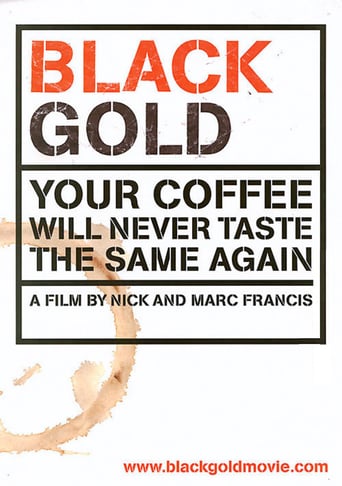alopez20011
This should be better than it is. It is one of a run of documentaries whose subject is so emotive, like Michael Moore's documentaries that the subject often covers up the cracks and limitations of the film itself. Nick and Mark Francis's documentary exposes the fascinating and horrifying means of coffee producing that seems so innocent when you are making it in the morning unaware of the exploitation and human suffering that went into providing you with this innocent beverage.Although portraying the inequalities that are part of coffee producing and the cheap labour that is used in order to keep process down and revenue for the coffee companies high this film still misses the mark. The poverty of the Ethopian farmers is carefully and lovingly displayed which makes this necessary viewing for anyone and especially coffee drinkers but the film is still made in a blunt matter of fact way that doesn't allow the farmers voice to be properly expressed and that is the film's disappointment
movedout
If you didn't already know that coffee is big business, then Nick and Mark Francis's documentary should hammer that fact in. "Black Gold" could have quite easily become another impassioned and reckless rail against globalisation but you get the sense that the brothers kept their eyes on the numbers, and directed from their head and not their hearts. Therein lies the film's main problem – facts are boring. It's neither harrowing nor heartfelt. The documentary is bluntly informative of the disparate levels in income of the Ethiopian farmers and the corporations that buy the beans from them on the cheap, and it's quite competent in enlightening consumers of the buried cost of a $5 latte. And on that level, it succeeds. Somewhat admirably, they lionise the Ethiopian people, both the underpaid farmers and the ones who refuse to partake in the hopeless work. But you can also observe that the Francis brothers were hoping for something more from their primary subject, Tadesse Meskela, a high-level representative from the Oromia Coffee Farmers Co-operative Union. The directors do place him on a pedestal for most of the film, even to the extent of including an embarrassingly effusive interview from Meskela's wife as the man proudly looks on.
afrotrash
A fantastic insight into the coffee trade, especially in light of the fact that many may protest about the rate of Starbucks' hitting street corners despite few knowing the real facts of international coffee culture and trade.The strength with which this documentary gets to grips with trade barriers, price fixing in the industry and the falsehoods that Coffee Houses provide (to give the impression of caring about free trade produce) gives the viewer a really good understanding of a problem that exemplifies the facts of world economics at large.Was lucky to catch this film at the NFT in London and thought it was a seriously captivating documentary, largely as a result of the power of the stories the camera was able to provide. The sight of the malnourished child (though not under-nourished enough for aid treatment), although witnessed countless times before in other settings, remained poignant. The juxtaposition of the Barista competition in Seattle against the shots of the Ethiopian coffee traditions was a timely reminder of the differences in lifestyles that continue in the world, despite our proclamations of globalisation and the world effectively becoming smaller.It would be wrong to call this 'another Michael Moore flick', but it would be a shame if this film did not cause the same level of debate
rkeller87
Black Gold is an astounding look at what it means for the powerful at WTO talks to set a price of $0.22 for a kilo of coffee on the world market.You might think this topic could grow dull, but it never does: The pairing of these stories and the well composed score keep you on edge throughout the film. The film follows a fellow who markets coffee from an Ethiopian collective, and his message is simple: Africans are not getting fairly compensated for their crops on the world market. Prices for their commodities are artificially low, keep Africans dependent on U.S. aid, and demean an entire people by not paying them what they are worth. It's not his impassioned words that haunt you, however, but instead the toddler girl who gets weighed -- and sent home with her mother and no help because she's only "semi-malnourished" and doesn't qualify for aid. It's the fellow hacking out an beautiful coffee patch to clear it for growing chat, a narcotic leaf that folks chew to feel better and that commands a higher income per acre than coffee. This documentary is definitely worth seeing if you are at all interested in how your cup of Starbucks got into your hand. Incidentally, this is destined to be a minor classic in food journalism as well -- it's a must-see for the conscientious omnivore.

